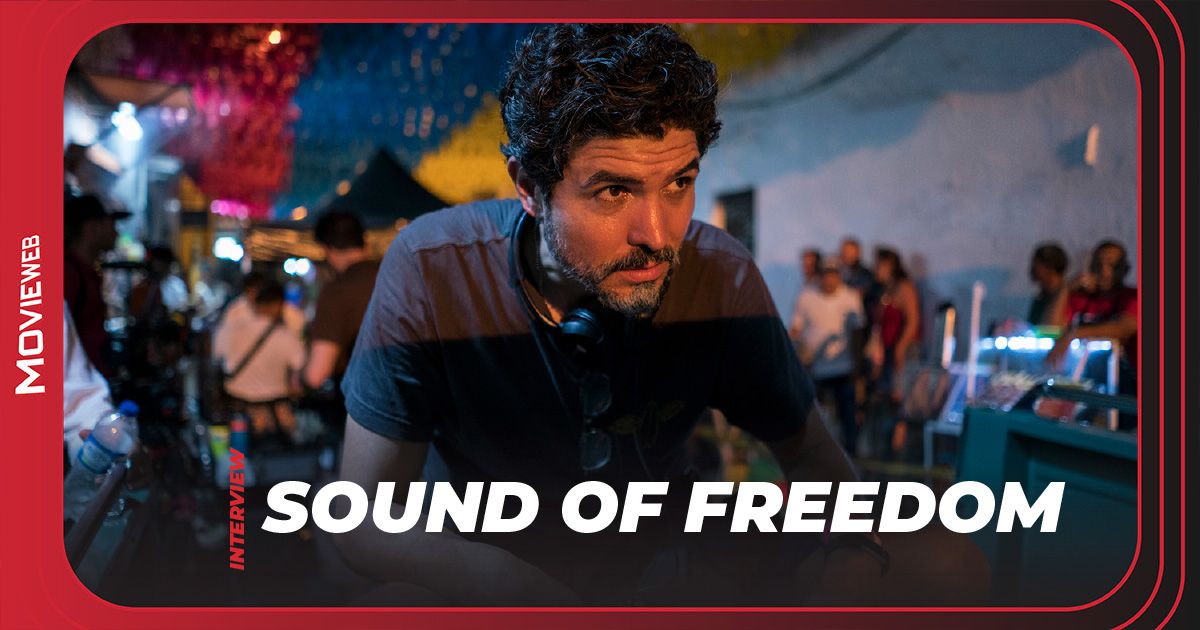
Sound of Freedom Director Alejandro Monteverde Clears the Air
Aug 16, 2023
How do you feel about Sound of Freedom? More importantly, why do you feel that way? Have you seen the film? Have you heard Tim Ballard or Jim Caviezel speak about it? Have you seen it lampooned or dissected across the internet? Is your opinion of the film based on the film, or based on ideological presuppositions? Do your beliefs transmogrify the media you consume and change it into a supporting argument for your own political persuasions?
If you watched Sound of Freedom in a vacuum, without any cultural context or background, you’d experience a painful but well-made movie that focuses on child trafficking and one Homeland Security agent’s obsessive, dangerous, but righteous attempt to avoid the red tape of bureaucracy and save some trafficked children. You’d notice some meticulous dolly shots, some beautiful cinematography and lighting, and some extremely emotional beats. The last thing you’d ponder, though, is deep state conspiracies, theological concepts, or political movements like QAnon.
And yet, Sound of Freedom has become a Rorschach test of sorts for people’s political beliefs. You can almost tell who someone will vote for based on their opinion of the film. How did this happen? Where did it come from, and what does it say about us?
Mexican-American filmmaker Alejandro Gómez Monteverde is providing some clarity. The director and co-writer of Sound of Freedom is a thoughtful, kind, and beleaguered man. He’s an extremely talented filmmaker, with his debut feature, Bella, garnering numerous awards and honors, from TIFF’s People’s Choice Award to becoming the top-rated film in readers’ polls for The New York Times, Yahoo, and Fandango the year of its release. He was even invited to the White House during George W. Bush’s administration to receive the “Outstanding American by Choice” Award for the film, and watched the 2007 State of the Union address with First Lady Laura Bush.
Monteverde is a filmmaker, not a political extremist. And so when he co-wrote and directed Sound of Freedom, he never expected the hot air-inflated controversy that would surround his fine film. He didn’t want this. And now he’s clearing the air. Monteverde spoke with MovieWeb about the film, its long journey to theaters, and the misconceptions and issues swirling in its orbit.
How Child Trafficking Went From Fiction to Fact
Angel Studios
Monteverde’s gracious but troubled soul radiates from his eyes during the interview. The world keeps tripping him up with tragedy, despite his immense talent and good nature. Monteverde’s father and brother were kidnapped and killed in 2015. Maybe that’s one of the reasons why he responded so emotionally to a news report some time later about the sexual exploitation of kidnapped children.
“This film was definitely a calling. Like, I didn’t wake up one day and say, ‘I want to make a movie about child trafficking.’ Definitely not,'” explained Monteverde. “I came home one night, and this is one part that’s been the missing link in the media [coverage of the film]. I came home around 11 one night, and that was when DVR was still in place. And I used to record my shows, and I recorded 20/20, 60 Minutes, or Dateline NBC, it was one of those three shows, and I used to watch them all and then fall asleep.” He continued:
And one of those pieces was about the sexual exploitation of children, and also child trafficking. I remember I couldn’t sleep that night. I woke up the next day and I talked to my wife, and I said, “I’m gonna make a movie about this.”
“You know, I have three kids. So she’s like, ‘Are you sure you want to go into this?'” recounted Monteverde. “I said, ‘Yeah, but I’m not gonna go too deep. I’m always gonna stay at the tip of the iceberg,’ and I’m trying to tell the story this way. So when I started writing, for two months, I had a whole film planned out from beginning to end. I registered with the WGA, we were ready to go, and I pitched it to my representation, to my agents.”
Angel Studios
And then a twist of fate, a ‘right place, right time’ situation, took hold of Monteverde’s cinematic future. “So I met with the producer of the film, and I said, ‘Hey, can you call me and raise the funds so we can release this? It’s an important film,’ and it was completely fiction,” explained Monteverde. “And one day, I got a call from the same producer, and he says, ‘Hey, do you know who Tim Ballard is?’ I said, no.”
I did a little research. At that time, Tim Ballard was not the controversy that he’s become today, there was only three or four links to him that I could find […] But it was just very simple. I was like, “I would love to meet with him,” because he was a former agent, just to kind of gather more information, but I wasn’t meeting him to see if I was going to do his movie.
“So when I met him, and I had all these questions, I realized that his life story was so similar to my fictional story,” continued Monteverde. “So the conversation shifted to like, ‘Are your life rights for sale?’ One thing led to another, and we ended up partnering, and I ended up starting to write his life story.”
Sound of Freedom Dramatizes the Truth
Angel Studios
And so, the real script and filming began. Real, however, is a contextual term. “Obviously, and I say this in advance, like any biopic, I had to take creative licenses. Every biopic in the world has to take creative licenses in order to put 30 years into one or 10 years into an hour and a half, and also to make it more cinematic.” He elaborated:
“The minute you make something cinematic, like the lighting, it’s already — the lighting does not really exist in the real world, right? You don’t get perfect light in real life. You dramatize everything, and make a show. A spectacle of stories. Schindler’s List is my favorite film of all time, but you see that it’s very film noir, and then has all these beautiful things, it has the red dress […] Obviously you don’t watch the movie and start questioning if Schindler did this; you’re focusing on the horrors of the Holocaust. And this is what I tried to do. I don’t want people to focus on the details, I want people to focus on the big theme. Child trafficking is happening.”
“So that was the motive and that’s how everything began,” said Monteverde. “And that’s how we ended up here.”
Fictionalization allows access to the truth; it creates a wider entrance, so that more people can understand what’s really happening. That’s why the masterful 10-hour documentary Shoah was a failure in comparison to Schindler’s List. The former is arguably a better film, but it doesn’t put butts in seats.
Did Disney Shelve Sound of Freedom?
Angel Studios
However, those butts almost never met the seats they were destined for. While Sound of Freedom has become a surprising box office success, it almost never went to theaters at all. The international branch of 20th Century Fox supported the film, but when Disney bought out Fox, some things got lost in the shuffle, and Sound of Freedom almost disappeared permanently.
And no, this wasn’t some deep state conspiracy. No, movie theaters aren’t shutting down the air conditioning to prevent people from seeing the film (why would they screen it in the theater then?), and no, there isn’t some pedophilic cabal attempting to keep people from watching Sound of Freedom. Monteverde explained the long journey:
“I think what happened was the following. You know, when Disney bought Fox, imagine all the content that there was to go through. I think we got lost in translation. We were a little movie. Also, we were with Fox International, which is even a step farther from domestic Fox. So I just think that, when the merge happened, our film got lost. I don’t think it was intentional to be like, ‘Oh, we don’t want anyone to see you.’ I just think it was the nature of when one company gets bought.”
“And then COVID happened,” continued Monteverde. “And you know, everybody thought that after COVID, people wanted to see movies that are very happy and not heavy. So our film started to even get more on the shelf, because people, the minute they heard what the film was about, I don’t even think they were considering it, because of the heaviness.”
So, I want to believe there was not a bad intent. I just think that the circumstances didn’t help our film. But looking back retrospectively, I think also right now people are more familiar with the theme. If we had come out earlier or another year, I don’t know if we’d get the box office success that we have had. I think the timing just happened to come together perfectly, and the universe kind of aligned to launch this kind of film.
Alejandro Monteverde Talks Labels
Angel Studios
And now we’re here. Perhaps we’re in the summer of politically divisive cinema. Barbie sparked a whole culture war about misandry and patriarchy; Oppenheimer led to debates about toxic masculinity, the American military, and nuclear armament. Mission Impossible sparked debates about artificial intelligence. And Sound of Freedom? Despite pretty much everyone being in agreement that “child sex trafficking bad,” apparently it’s a political film. Or a faith-based one. Or something.
So what happened?
“This is a very good film to kind of study our society,” said Monteverde. “And I never thought like that. I’m actually thinking like that for the first time. It’s this inclination and desire that we have as a society to want to label everything, even if we label it wrong. This is a good example of where we are now. We have been trained to continue to label things, and it doesn’t matter if we’re right or wrong.”
What’s the need to label it? Why don’t you just say, “I didn’t like the movie?” […] Why do they need to say this is a faith-based film? In which way is this a faith-based film? I’ve seen movies where the characters are dressed as priests, like Silence from Martin Scorsese. They’re not called faith-based films. In Million Dollar Baby, you have the character going to see a priest, and they talk about God. That’s not a faith-based film.
Angel Studios
“Now we need to label everything. And labeling is very dangerous,” continued Monteverde. “And I do feel like this film has been a victim of the wrong labeling. Now, right labeling is really hard. You have to do a lot of research to correctly label something, and even more if you’re going to label a person. You have to get to know the person deeply before you can even put any label. People are not taking the time.”
Tim Ballard, Jim Caviezel, and the Wrong Message
Angel Studios
Some may argue, however, that the people behind Sound of Freedom “shot first” in the culture wars. It’s true that Tim Ballard and Jim Caviezel have spoken to right-wing conferences and news outlets about their beliefs, and suffice it to say, things have gotten extremely political. And yet, the film itself is not a political movie.
“I think what happened is, they were eager to talk about the film, and I feel in the beginning, they were invited to speak in certain venues that automatically, by its nature, politicized the film,” explained Monteverde. He continued:
I know Tim Ballard. All he cares about is creating awareness and passing legislation and helping people to understand the problem, so they can get funded, to get the U.S. government and the world governments to kind of create support for this.
“But yes, I wish this division, this political division wasn’t happening, especially on the film,” added Monteverde. “And my first instinct, when I started seeing the labels and the attacks on the film, was to distance myself, and I did that. And I wanted to hide, and I was like, ‘You know what, I’m not gonna go to the screenings. I’m not gonna go to interviews.'”
“It’s heartbreaking. I’m the author, and that was my conflict. But maybe I should come out and clarify what the motive was. Because it doesn’t matter, at the end of the day, I wrote the script, and I directed the movie, so I’m the author, and people should know what was the motive behind all of it, and then they’re gonna figure it out.”
Angel Studios
Now, after everyone has said their peace, ironically sending more clouds of confusion into the conversation, Monteverde is clearing the air. “I think it was labeled as a result of the personal beliefs of some people that worked on the film, but that has nothing to do with the film,” said the director.
You know, I give this example all the time. I call it the hamburger example. And it’s like, if the guy who makes the meat belongs to a certain faith, let’s say he’s Muslim, and the guy who does the bread is an Orthodox Jew, and then the guy who serves the food is Catholic, when you get the burger, and you bite into it, you don’t say, ‘What a great religious burger.’ You don’t say that.
“Judge a project for what it is. That’s my thinking here, that what happened is, you know, the personal beliefs of some of the talent in the film kind of got in the way and influenced the way the film was seen,” added Monteverde. “But I can’t control that, you know. I cannot.”
“It’s not the first time that happened to me. I am used to it, every movie I’ve done, right away it’s labeled. And with Sound of Freedom, I was like, ‘I wonder how they’re gonna label this. They cannot label this as faith-based.’ And it was to my surprise. Never say they can’t do something. They’ll label you directly if they need to.”
Let Sound of Freedom Ring
Angel Studios
Step outside the hubbub of controversy, and Sound of Freedom is actually an aesthetically pleasing film that balances cinematic beauty and entertainment with an extremely tough subject. “You have to add beauty to this tragedy, so people can digest the content,” said Monteverde.
The director is excellent at that, and is likely relieved to be moving on from his most talked-about film, even if he has to step back to a smaller stage. His next film, Cabrini (out next year, watch this space), looks absolutely gorgeous, and is filmed in a radically different way, with much more choreographed motion and no coverage. It’s supposed to be a nod to his maestro, the great Soviet filmmaker Andrei Tarkovsky. We can’t wait.
A simple plea. Stop discussing Sound of Freedom if you haven’t seen it. It’s not what you think. If you have seen it, and think it exposes the pedophilic deep state conspiracy, look again. This is not your Triumph of the Will. This is a good film about an important subject, just like many other titles, from 12 Years a Slave to Schindler’s List. Nobody watched 12 Years a Slave and attacked it as a militant proponent of Black Separatism, though. So let this film sound like itself, without all that needless noise.
From Angel Studios, Sound of Freedom is still in select theaters, more than two months after its release. You can watch the trailer below, and our whole interview at the top.
Publisher: Source link
These Are '80s Songs That Gen X'ers And Old Millennials Grew Up On, And There Is No Way Anyone Under 27 Has Heard All Of These
And if you are over 40, then you probably remember when these were brand-new and not songs kids are discovering on TikTok.View Entire Post › Disclaimer: This story is auto-aggregated by a computer program and has not been created or…
Jan 12, 2025
Tom Holland Asked Zendaya’s Dad for Permission Before Proposing
Tom Holland wove the perfect engagement for Zendaya. Less than a week after the Spider-Man actress debuted a 5-carat diamond ring on her left ring finger at the 2025 Golden Globes, Tom's father Dominic Holland confirmed the couple's engagement, sharing a few parts about the special day, including one important detail.…
Jan 12, 2025
Jennifer Lopez Finally Understands Mi Gente Latino Meme
Jennifer Lopez Finally Understands Mi Gente Latino Meme Kicking off 2025, J.Lo is now promoting Unstoppable, a new biography drama in which she stars alongside Moonlight actor Jharrel Jerome. At the 2011 American Music Awards, Jennifer won Favorite Latin Artist…
Jan 11, 2025
Tom Holland's Dad Shares Insight Into Zendaya Engagement
Tom Holland became the greatest showman for his proposal to Zendaya. Just days after the Spider-Man actress turned heads at the 2025 Golden Globes with a 5-carat ring on that finger, Tom's dad... Disclaimer: This story is auto-aggregated by a…
Jan 11, 2025











